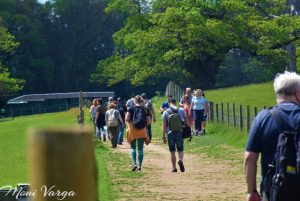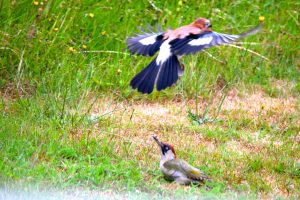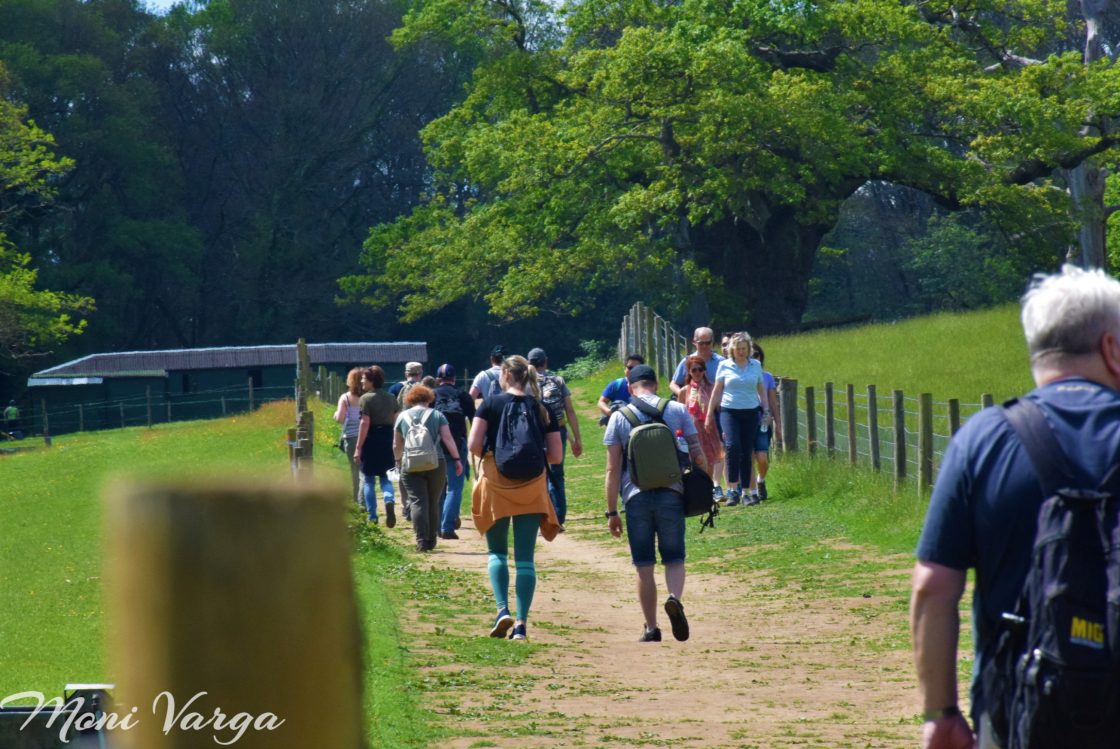
With Cop 26 on in Glassgow, and the Eartshot Prize launched by Prince William and The Royal Foundation in October 2020 , centred around five ‘Earthshots’ , sustainability is becoming more and more important.
Question we can ask is are all walking groups sustainable? What can we do to be more sustainable and how to walk and hike sustainably?

Picture taken by a regular history hiker : Moni Varga
Here are some ideas:
Commute
When travelling to our hiking destination by using public transport or considering lift sharing we reduce our impact on the environment and parking spaces.
Group Size matters
Why should group sizes be small? If you walk through the landscape with a group of 30-40 the impact on the environment is greater. Consider walking in small groups.
Either stay on paths or well away from them – avoid walking on path verges as the most vulnerable areas are those immediately to the side of paths where users spreading out from the path can lead to increased wear and badly eroded paths developing. This year when visiting Painshill Park some of you might have noticed badly eroded paths as the park have received high number of visitors and people trying to social distance walked off the path causing erosion in the surrounding areas.

Wildlife
Consider when and where you hike or scrambles mas some areas are restricted during nesting season . Think of a bird’s nest and your mind will probably wander high up into the branches of a tree or hedgerow – but not all birds have such lofty ambitions. Many species nest on the ground, from coastal seabirds to wetland waders and the more familiar ‘farmland’ birds like lapwing and skylark. This strategy does present some obvious risks and the nests tend to be well camouflaged, so it’s always worth watching your step during the breeding season (March to September).
It can be tricky to see is the enigmatic nightjar, a nocturnal bird with such impressive camouflage that it is barely visible during the daytime. Nightjars begin nesting in May – although there isn’t actually a nest, and the eggs are laid straight onto bare ground.
Looking after footpaths
Did you know that long distance footpaths have to be maintained as well? You can report a fallen tree or a badly eroded path to the relevant organisation who looks after the footpath.
Dogs :
Some of you have asked weather you can bring dogs on the walk. Some walks are dog friendly some not so much , depending on the season. You need to keep your dog on a short lead of no more than two metres between 1 March and 31 July each year to protect ground nesting birds, and at all times in the vicinity of livestock
Economy
Do everything you can to support the rural economy – shop locally, and when walking through villages consider the local population. Don’t peep through their windows or stand in crowds in front of their houses.
Leave no trace !
Do you know how long your litter will last ? Plastic bag 10-20 years, Plastic bottle 450 years, wine bottle is non biodegradable, food waste 2 years, paper bag 1month. Take your litter with you!
Wild camping
Useful to know that wild camping is not permitted by right on open access land in England and Wales without express permission of the landowner, but it is permitted in Scotland provided that you do so responsibly and follow the Scottish Outdoor Access Code.
Did you know that we are members of the Impact Travel Collective ?
We consider the 17 Goals to Transform Our World called SDGs set up in 2015 by the United Nations General Assembly when creating our history hikes.
“The Sustainable Development Goals are a call for action by all countries – poor, rich and middle-income – to promote prosperity while protecting the planet. They recognize that ending poverty must go hand-in-hand with strategies that build economic growth and address a range of social needs including education, health, social protection, and job opportunities, while tackling climate change and environmental protection.”
 https://impacttravelcollective.com/member/ildi/
https://impacttravelcollective.com/member/ildi/
You can check out our upcoming history hikes on our website : www.historyhikers.co.uk
meetup : https://www.meetup.com/history-hikers/
or why not join our Facebook page : https://www.facebook.com/groups/historyhikers.co.uk
Follow us on Instagram : https://www.instagram.com/history_hikers/

